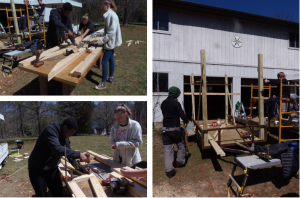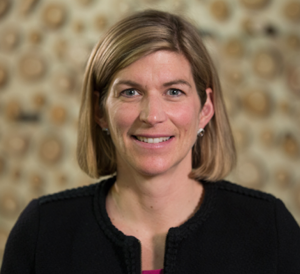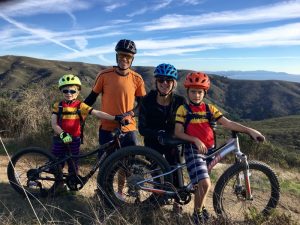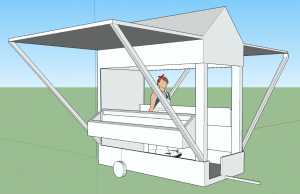We want to give you a glimpse into the extraordinary talent and expertise of those who serve our school on the board of trustees. Much of their work is done behind the scenes and is critically important to our ability to build a strong foundation for the future. One of those individuals is Letitia Webster, a mother of two young boys who attend our school and a top executive leading the enterprise-wide sustainability & responsibility program for one of the nation’s largest apparel and footwear companies, VF Corporation.
Letitia and her family relocated to Greensboro from the San Francisco Bay area in 2011 when she accepted the position as Global Vice President of Corporate Sustainability for VF Corporation. As leader of VF Corporation’s Sustainability & Responsibility (S&R) program, Letitia is responsible for creating top-line value through innovative business solutions that reduce the environmental footprint and improve the social impact of the business. Her focus includes using the scale and influence of the company around the world to make transformational change within the apparel and footwear industries.
Prior to that she had ten years of experience as the Brand Manager and Director of Strategic Marketing and Communications for The North Face, one of VF Corp’s most visible brands. While at The North Face, she managed the sports marketing program which produced The North Face Endurance event and a six part TV series entitled Never Stop Exploring. Webster launched The North Face sustainability program in 2006, leading the adoption of bluesign (a system for sustainable textile production), membership with Business for Innovation, Climate and Energy Policy (BICEP) and the Outdoor Industry Association's Eco-Index. Additionally, one of her accomplishments was the development of an Outdoor Participation program and team to encourage, inspire and enable people to get outside and start a lifetime of passion for the outdoors.
Since her early days at VF Corp she has been paving the way for more sustainable business development for the company. Letitia is driving a number of initiatives including: launching VF’s updated S&R strategy, Made for Change, releasing the company’s new S&R GRI progress report, reporting to the Carbon Disclosure Project (CDP) on VF’s carbon, water and forestry footprint, supporting fourteen Zero-Waste Distribution Centers and six LEED certified facilities, including LEED platinum world headquarters for the VF Outdoor Coalition, VF’s EMEA headquarters and the brand new Vans® brand headquarters in Costa Mesa, CA. She sets enterprise-wide global goals including a five year goal to reduce VF’s global carbon footprint by 5%, and exceeded it by achieving a 12.5% reduction. With her leadership, VF has committed to 100% renewable energy by 2025 for all owned and operated facilities and works to advocate for strong climate change policy at the local, national and international level. She attended and presented at the Paris Climate Conference (COP21) in 2015 with governmental and corporate leaders from over 150 countries. She works closely with VF’s 30+ brand portfolio leaders to integrate sustainability into their brand strategies to create engaging ways to connect their products and programs with their core consumers.
Click here to view an interview with Letitia and her colleague, Stewart Whitney of Timberland, at the 2016 GreenBiz Forum in Phoenix, Arizona sharing their experiences in driving and integrating corporate-level sustainability programs. In honor of her commitment and dedication to advancing systems that support sustainability on a global scale, Letitia was honored on International Women’s Day in March of 2016 by the organization known as Ceres that works with the most influential investors and companies to build leadership and drive solutions to tackle the world’s biggest sustainability challenges. Click here to read more about Letitia’s recognition on International Women’s Day. To say that we are fortunate to have her vision and leadership at GMS as we work toward a greener future is an understatement.
Webster holds a bachelor's degree in Business and Environmental Policy from Bowling Green State University and a master’s degree from Bainbridge Graduate Institute, a Washington-based institution that became the first to offer an M.B.A. in Sustainability and Change Management. In her previous life she was a Professional Ski Instructor, River Raft Guide and Kayak Instructor and the Executive Director of Telluride, Colorado’s local conservation group, Sheep Mountain Alliance. She served as a board member for various organizations, including Sheep Mountain Alliance and Telluride MountainFilm Festival and currently serves on the board of Communities in School of Greater Greensboro,which provides a network of support, services and adult mentors for young people facing adversity empowering them to stay in school. Also, as part of her roles at The North Face and VF, Webster spearheaded the development of the Sustainable Apparel Coalition and founded the Conservation Alliances’ Legacy Fund.
Letitia has shared with us that their family was drawn to Montessori education for their children because of our emphasis on environmental education, outdoor learning and innovative thinking. From her view as an industry executive, she said "We are seeing across the board in the corporate world that innovation is incredibly important. We need people who are diverse thinkers, who are creative thinkers, and who have a hunger to learn and to challenge the status quo. That is incredibly important as we think about being competitive in the world today and when I look at Montessori I think that this is a perfect primer."
Given her passion for sustainability and preservation of the environment, it should not come as a surprise that Letitia and her husband, Jason, are both outdoor enthusiasts and enjoy all manner of off-the-grid activities with their boys, Jack and Quinn, now ages seven and five. On any given weekend, you might run into them hiking or biking on the network of trails around the Triad, or headed to the mountains for a camping trip or a downhill skiing adventure.
Throughout the school year, the Junior High students at Greensboro Montessori School have multiple opportunities to delve into the study of economics through entrepreneurial experiences in both individual and group projects.
One project culminates in a Holiday Marketplace event that occurs annually during the second or third week of December.
Parents, students, friends and neighbors are welcome to come and shop at the 2017 Holiday Marketplace on Wednesday, Dec 13 from 9am-2pm in the gym.
The students work in small teams of two to three partners over the course of several weeks to develop a small business plan and manufacture a variety of hand-made products (art, food, clothing, gifts, etc.). These products are offered for sale to the entire community on the day of the marketplace event. The students are encouraged not only to design products that will make a profit but also products that are ethical and sustainable, benefiting the whole. This is a unique opportunity for the students to use their creativity, drive, talents, and business skills to make take home cash profits, which many use to fund their out of pocket expenses for overnight school field trips at the end of the school year.
In the Holiday Marketplace project, our young adolescents experience the true life of an emerging entrepreneur and small business owner:
- conducting research and development for their products,
- renting a booth/ retail space,
- creating a store front,
- paying utilities and taxes,
- developing marketing and customer service strategies,
- repaying their start up loans and
- calculating and equitably sharing their profit.
The "utilities, taxes and booth rental fees" that they pay are deposited into a school account that goes back into the Junior High to cover curricular and program expenses.
The Holiday Marketplace project represents just one aspect of how our students experience and study the principles and realities of economics. Another way is through their participation in a year-long micro-economy program that occurs every Friday. Unlike the marketplace project where the proceeds result in personal profit, the micro-economy program is designed so that any proceeds are reaped communally and expenditure must be decided on by the whole group. In some ways the micro-economy program is a “grown-up” version of the practical life lessons that are so effective in teaching our youngest students about respect for self, respect for the environment, and respect for the community as well as basic executive function skills.
The regular micro-economy program in the Junior High occurs in organized weekly sessions where the students experiment with practical life experiences in preparation for later life work. This emphasis on “real work,” as some would call it, is rooted in Dr. Maria Montessori’s belief that adolescents should learn about economic principles that govern production and exchange. By doing so, she proposed that adolescents would develop a deeper appreciation for available resources, the importance of hospitality, and that the work would provide a context for understanding human civilization and their role within it. This is work with the head and the hands! As part of micro-economy program, students engage in a plethora of meaningful work, which builds professionally applicable skills, encourages interdependence, and peaks intellectual curiosity.
Early in the school year, students begin the micro-economy program by preparing a resumé and applying for specific jobs. These jobs fall within three basic career areas, most of which directly relate to the operation of Maria’s Café, our commercially inspected restaurant program that serves a hot home-made lunch on Fridays. One team manages the kitchen including the menus, ingredients (both store bought and sourced from our gardens), food preparation and food service. Another team oversees the financial and marketing aspect of the micro-economy, and plans Junior High community events, outreach and fundraisers. The third team comprises a research and design lab that develops and fabricates new marketable products through use of tools and technology (3-D printer, state of the art design software, wood shop. etc.) and also produces the school’s yearbook.
This experience for our students is an example of applied learning at its best!
"The willingness to show up changes us. It makes us a little braver each time." - Brené Brown
I think Brené Brown and Maria Montessori would be fast friends, had they lived during the same time. They both believe deeply in showing up as who we are … and in following that authentic self. Montessori calls it following the child; Brown calls it being authentic and vulnerable in order to find wholehearted living. It’s important to say that the concept of “vulnerability” has evolved into a positive and beneficial behavior and characteristic in both Brown’s and my research.
Montessori wrote that “the child is capable of developing and giving us tangible proof of the possibility of a better humanity. We have seen children totally change as they acquire a love for things and ideas and as their sense of order, discipline, and self-control develops within them.... The child is both a hope and a promise for all humankind.” A hope and promise for humankind starts at the center of the child’s ability and gift to show up as who they are. If this concept interests you, I thought I’d walk you down a path of Brown’s research, and why I think it ultimately connects to our work at GMS.
Brown began her research journey in the field of social work with her basic belief about the necessity of human connection. “Connection is why we’re here; it is what gives purpose and meaning to our lives” (Brown, 2012a, p. 253). Her dissertation explored assessing relevance in professional helping (e.g., pastoral care, psychologists, educators, or organizational leaders). Over six years, she interviewed 1,280 professionals to develop her theory of accompaniment.
Through asking her participants about human connection, she ended up developing the related ideas of shame and shame resilience. Asked about human connection, participants invariably ended up talking about instances of heartbreak, betrayal, and shame, which Brown defined and coded as the fear of not being worthy of real connection. That emerging pattern led her to return to her data to investigate why and how some were resilient to this shame, heartbreak, and betrayal. She eventually developed a model of shame and shame resiliency, which revolved around empathy, courage, compassion, and connection. The patterns in her data pointed to wholeheartedness, which Brown developed into what she called wholehearted living. And from her study of wholehearted living, Brown then focused her research attention on the power of vulnerability. Vulnerability and having the courage to show up authentically and humbly as who we are connects to how we ask our students at GMS to show up. Brown (2012a) wrote, “Vulnerability is the core, the heart, the center, of meaningful human experiences” (p. 12). Vulnerability (being open, authentic, and humble) directly connects to a person’s ability to honestly know their self and their limitations.
Here is where we begin to connect more to the work we do at Greensboro Montessori School. We believe, just as Maria Montessori, that we are always striving for meaningful human experiences and lessons. To achieve this, we need to empower our students to think independently, critically, and openly. And that takes courage.
To be comfortable with their personal vulnerability, Brown writes that people must first have a strong sense of love and belonging. We work to instill that belonging everyday in all our classes. That sense of worthiness is a foundational path for students to find greatness. Conversely, when people cannot be real and honest, i.e. vulnerable, they block great ideas and innovation. Brown (2012a) identifies a lack of vulnerability as the “most significant barrier to creativity and innovation” (p. 187). This lack of vulnerability fosters a fear of change and close-mindedness. If we cannot empower our students to take safe risks and to see the value of struggle and failure, then we may be stinting their ultimate growth.
It takes courage and bravery for students to have new ideas and try new things. Entrepreneurship, growth, and new ideas cannot thrive in an environment that does not welcome openness and authenticity. One participant in an interview with Brown (2012a) said, “When you shut down vulnerability, you shut down opportunity. By definition, entrepreneurship is vulnerable. It’s all about the ability to handle and manage uncertainty” (p. 208). Entrepreneurship thinking and habits of mind is something we pride ourselves on at GMS.
And as for how we create a culture that welcomes these ideas of vulnerability, true courage, and entrepreneurial thinking, school research is crystal clear that we need adults in schools (leaders and teachers) who are willing to display and model this open sense of courage in a quest for better understanding and learning. The adults must first have the courage and wisdom to intentionally be vulnerable. As an adult learning community of about 60 employees, we work everyday to be open to ideas, as we mindfully and intentionally follow the child. I also invite each of our parents to intentionally join us on that journey as we partner to help empower our young people to be confident and inspired to display the sort of courage that Brené Brown writes about.
I’ll leave you with a final thought from Brown. While the quote is specifically about leaders, I think applies all the same to us as parents, as teachers, and as human beings:
“Across the private and public sector, in schools and in our communities, we are hungry for authentic leadership – we want to show up, we want to learn, and we want to inspire and be inspired… When leaders choose self-protection over transparency, and when self-worth is attached to what we produce, learning and work becomes dehumanized… Re-humanizing work and education requires courageous leadership. It requires leaders who are willing to take risks, embrace vulnerabilities, and show up as imperfect, real people. (Brown, 2012a, p. 5)
Have a great and courageous weekend.
- Kevin
Works Cited
Brown, B. (2002). Accompanar: A grounded theory of developing, maintaining, and assessing relevance in professional helping (Unpublished doctoral dissertation). University of Texas, Austin.
Brown, B. (2010a). The gifts of imperfection: Let go of who you think you’re supposed to be and embrace who you are. Center City, MN: Hazelden.
Brown, B. (2012a). Daring greatly. New York: Gotham Books.
Brown, B. (2012b). Vulnerability and inspired leadership. Bill & Melinda Gates Foundation Leadership Series.
Montessori, M. (Published 1992). Education and Peace. The Clio Montessori Series.
Click here to check out a whole host of books and audio published by Brené Brown
After two years worth of planning, design, collaboration, development and fabrication, our Junior High students will be hosting a grand opening of their newest venture, Maria's Market Farm Cart, including a special ribbon cutting ceremony with the Greensboro Chamber of Commerce. (The ceremony is being planned for early 2018. It was originally scheduled for December but was postponed due to inclement weather.) This project has been a near perfect example of how our students work together to bring an idea to life while engaging in real, purposeful work that not only stimulates their intellect but also teaches them valuable, lifelong skills in entrepreneurship and economics.
Maria’s Market Farm Cart was developed through an aspect of the Junior High Curriculum known as the Micro Economy Program. The 2017-18 school year marks the fifth year running the program as an integrated "Farm to Fork” business. At the beginning of each school year, students apply for jobs in the program based on their interests, talents, and abilities. Branches of the business include Research and Development, Design and Fabrication, Finance, Tribal Council, an on-site Restaurant, and a Farm Team. Click here to read more about the Micro Economy Program.
At the beginning of the 2016-17 school year, the Farm Team submitted a proposal to the Design and Fabrication Team to build a mobile market stand where produce from the School's gardens, eggs from the School’s chickens, and original student art could be sold. The Design Team jumped at the project, pledging to retrofit an old trailer bed generously donated by the School’s garden manager, Aubrey Cupit.
As the team envisioned a functional design for the mobile market stand, the team members, guided by Upper School Performance and Visual Arts Teacher Jonathan McLean, used an application called Sketchup to create the first 2D images of a mobile cart.
Student designer, Lily Wagoner, studied images, took real time measurements, and made a cut and materials list. After this thorough research phase, students began the process of building the cart. Bit by bit, the project came together with the final stages including staining and painting the cart.
Maria’s Market Farm Cart officially debuted at the 2017 Fall Festival on October 15 and has been open for business several times since then. Every Friday afternoon that Junior High has a Micro Economy day the farm cart will be open from 3:00-4:00 PM during the afternoon carline. All of the produce for sale is harvested by the students from the School's gardens. Students also make crafts and original artwork to contribute to the market, including items made by the Research and Development Team in the metal forge.

Junior High students work together to fabricate the farm cart applying principles of geometry and physics.
The Farm Cart and all of the integrated work throughout the student-run Micro Economy Program is a wonderful example of how these entrepreneurs are able to use their intellectual abilities to produce viable work that relates to real life, while simultaneously teaching them to be leaders and entrepreneurs. It also addresses the complexities of doing ethical work that benefits the community and ultimately the world. In the process, they learn the meaning and pleasure that can be derived from such work. It is what Maria Montessori envisioned for the adolescent and we couldn’t be more excited about encouraging this vital work.
“The shop would also necessitate a genuine study of commerce and exchange, of the art of ascertaining the demand and being ready to meet it, of the strict and rigid rules of bookkeeping. But the thing that is important above everything else is that the adolescent should have a life of activity and variety and that one occupation should act a “holiday” from another occupation. The shop would be in respect to the studies of economics and politics an educational object, similar to the aquarium or terrarium in the case of the study of biology.” - Maria Montessori (From Childhood to Adolescence, 70)
“Their spirit will dry up if the grandeur of the practical reality of our days is completely shut away from them, as if it did not exist. Men with hands and no head, and men with head and no hands are equally out of place in the modern community." - Maria Montessori (From Childhood to Adolescence p. 61)
Every Friday, Junior High students at the Greensboro Montessori School participate in a hands-on experiential education program in which they work together in teams simulating different aspects of a micro economy that is based on a Farm to Fork concept. One of the outcomes of the program is the preparation of a weekly meal for 40+ people in our certified kitchen. This self-run lunch business is known as Maria’s Cafe. Another outcome of the micro economy program is the operation of a mobile farmer’s market stand that enables students to sell produce from the School’s gardens and student artwork. Keep reading to learn more about the structure of micro economy program and how students are acquiring skills that will serve them long after graduation.
Each student cycles through a “career” in their participation in the micro economy program. There are a total of six career choices – research and development, design and fabrication, tribal council, finance, farm, and restaurant. Each career has a specialized focus and functions as its own entrepreneurial enterprise. Students apply for management positions within these careers and have a chance to hone in on particular interests and skills while serving the community. While each career has its own focus, all together, they operate under one umbrella known as Irossetnom Micro Economies Incorporated, also known by its acronym, IMI. (If you’re wondering about the name Irossetnom, that’s Montessori spelled backwards!)
On the Research and Development Team students specialize in scientific research and product development. Their current projects include managing the GMS chicken chickens, which they bought in 2016, and selling eggs, as well as making products in the forge that can be sold at Maria’s Market. Management positions include Director of Scientific Inquiry, Sustainability Coordinator, and Science Writer.
On the Design and Fabrication Team students work with 2D and 3D Design. They take photographs and design the GMS yearbook annually. They also take orders from the community on 3D products ranging from new classroom tables, to toddler picnic tables, to wooden recycling center bins on casters, to the GMS Farm Cart. Students work with design products like SketchUp to create 2D templates for products before they engage in the real life building process. Once made, these beautiful items are sold. Management positions include 2D Creative Director, Media Coordinator and Director of Technology, Media Assistant, and 3D Creative Director.
The Finance Team oversees finances for all of IMI. They process receipts for ingredients and materials, analyze operation costs, and present findings on net profits to the community on a weekly basis. They also conduct some marketing activities, like creating order forms to reserve food on Fridays, conducting surveys to find out how “customers” find the dining experience, and managing credit card sales and pre-orders. Management positions on this team include Chief Financial Officer, Assistant Bookkeeper, and Marketing Director. The Finance Team also runs a concessions stand.
The Tribal Council Team is the governing body of IMI. They host special events like dances, the Evening in the Pumpkin Patch (a Halloween-themed event for younger GMS students), Rock-a-thon (an all-night movie watching marathon to raise money for charities), a holiday toy drive, talent shows, and other special events benefiting the whole by bringing everyone together to celebrate community and raise money for charities and IMI. Management positions include equal representatives within the council.
On the Farm Team, students participate in all aspects of growing the food and getting it to the Table (Maria’s Cafe), and to the Farm Cart (Maria’s Market). They plant seeds, build greenhouse platforms, harvest and wash vegetables and deliver them fresh to the kitchen (very, very fresh,) take inventory on garden produce and plan for future crops, maintain the bee hives, cut flowers and make bouquets to sell to local vendors, and learn about local agriculture, different methods of growing food and how each affects our planet, and help to plan future menus based on what is growing seasonally. They also decorate our tables with nature inspired settings. Many of the ingredients in our Maria's Cafe recipes come directly from the GMS gardens, especially whole unprocessed foods like garlic, onions, salad greens, eggplant, bell peppers, sweet potatoes, persimmons, apples, figs, crab apples, butternut squash, tomatoes, and much more. We use no genetically modified ingredients (GMO’s) and part of our mission is to understand what is happening to our food system and how we can play our part to fix it. What better way to learn to be a global responsible citizen? Management positions on this team include Market Manager, Produce Manager(s), and Tea House Manager.
On the Restaurant Team (Maria’s Cafe), students chop, julienne, emulsify, grate, and learn new skills every week as they prepare the meal, and clean up afterwards. They gain much culinary expertise and are held to professional restaurant rules. They are learning about industrial equipment and processes and are inspected by the Health Department three times per year. They learn knife and food safety as well as quick methods for peeling and chopping garlic and onions and how to work with the best and freshest ingredients to make a delicious meal. Management positions include Head Chef, Sous Chef, Pastry Chef, and Pantry Manager.





